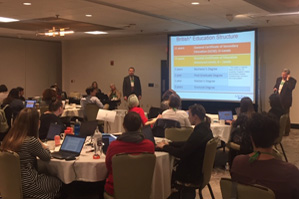 by Aleks Morawski, Winter Institute Faculty
by Aleks Morawski, Winter Institute Faculty
During an unseasonably warm week in February in Arlington, Virginia, I had the pleasure to participate as a faculty member in the Winter Institute for International Transfer Credit, a four-day intensive workshop on international credential evaluation focusing on transferring credit from international educational records. This was my first training experience with AACRAO, and I could not have had a better time. Participating in this capacity is equally rewarding as attending the workshops as a trainee. The experience highlighted for me the importance of continuing education, professional development, and community in the profession of international education, essential aspects of success for those just starting in the field as well as those of us with experience to share with others.
International education systems are dynamic, as evidenced by the need for ongoing research and the regular publication of updated knowledge in the field. Just as foreign systems change, so does the US education system, and with it, best practices for working with international students and their credentials. Moreover, technology is always changing how this work is done, requiring us to adapt to new standards and norms while maintaining the integrity of our institutional processes. At this Winter Institute, I was surprised to learn that many participants were experienced registrars and admissions officers attending this training for a second or third time. However, when delivering the  material and participating in the discussion, it was clear that continued training can benefit even the most experienced. As a trainer, I found this most appealing, not just for delivering the program adequately, but for the opportunity to learn from the questions and answers shared with the group, which will strengthen my training skills and my every-day credential evaluation processes.
material and participating in the discussion, it was clear that continued training can benefit even the most experienced. As a trainer, I found this most appealing, not just for delivering the program adequately, but for the opportunity to learn from the questions and answers shared with the group, which will strengthen my training skills and my every-day credential evaluation processes.
Professional development such as the above was essential for crafting my career in international education and continues to be so. I consider myself lucky to have worked for supervisors who understood the need for training workshops, networking opportunities, research presentations, etcetera to foster success in my various roles in the field. As a supervisor, I now try to provide the same benefits to my staff. Moreover, am privileged to share my experience through training and teaching, because that is as much a professional development opportunity as sitting in the audience many years ago, listening to my mentors’ presentations. I mention my mentors, because no one achieves success in this industry without developing a professional network and joining the community of international educators and learning from others.
There is not one volume, tome, or database with comprehensive instructions for international credential evaluation. If I attempted to publish one, it would require updates before it was completed, and would be faced with numerous exceptions and challenges, many likely posed by the author himself. There also is no college degree, singular training program or workshop that will teach us everything we need to know to “do” the work of an international educator. The only solution is to rely on each other when facing new challenges, new obstacles, and new ideas. This is why a community of professionals is essential. Even four days after the Winter Institute, I found myself engaged with an email discussion with one of the participants about the interpretation of a foreign grading scale. Fortunately we agreed, but I was intrigued to hear the perspective of balancing his institutional policies with a foreign grading practices, which I will take into account when developing policies for Scholaro. I look forward to many such emails and phone calls as well as productive discussions at upcoming conferences, training workshops, and collaboration opportunities in the future. This, for me, defines the benefit of being part of a community of international educators.